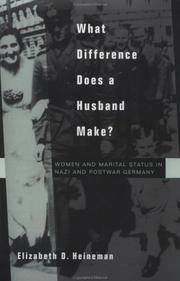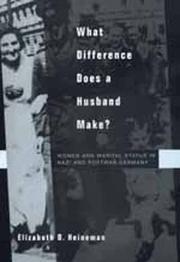| Listing 1 - 6 of 6 |
Sort by
|

ISBN: 0520239075 0520214250 Year: 1999 Volume: 33 Publisher: London University of California Press
Abstract | Keywords | Export | Availability | Bookmark
 Loading...
Loading...Choose an application
- Reference Manager
- EndNote
- RefWorks (Direct export to RefWorks)
Based on thorough and extensive research in German national and regional archives as well as the archives of the U.S. occupying forces, this book argues that marital status can define women's position and experience as surely as race, gender, sexual orientation, and class. Heineman finds that, while the war made the experience of single women a dramatic one, state activity was equally important. As a result, West German women continued to be defined in large part by their marital status. In contrast, by the time of reunification marital status had become far less significant in the lives of East German women. In October 1946, seven million more women than men lived in occupied Germany. In this study of unwed, divorced, widowed, and married women at work and at home across three political regimes, Elizabeth Heineman traces the transitions from early National Socialism through the war and on to the consolidation of democracy in the West and communism in the East.
Single women --- Marital status --- Social conditions --- History. --- Psychological aspects --- Spinsters --- Unmarried women --- Single people --- Women --- Marital condition --- Status, Marital --- Marriage --- Social status --- History --- Social conditions.

ISBN: 0520937317 0585230056 9780520937314 9780585230054 9780520214255 0520214250 0520239075 9780520239074 0520214250 Year: 1999 Volume: 33 Publisher: Berkeley : University of California Press,
Abstract | Keywords | Export | Availability | Bookmark
 Loading...
Loading...Choose an application
- Reference Manager
- EndNote
- RefWorks (Direct export to RefWorks)
In October 1946, seven million more women than men lived in occupied Germany. In this study of unwed, divorced, widowed, and married women at work and at home across three political regimes, Elizabeth Heineman traces the transitions from early National Socialism through the war and on to the consolidation of democracy in the West and communism in the East.Based on thorough and extensive research in German national and regional archives as well as the archives of the U.S. occupying forces, this pathbreaking book argues that marital status can define women's position and experience as surely as race, gender, sexual orientation, and class. Heineman finds that, while the war made the experience of single women a dramatic one, state activity was equally important. As a result, West German women continued to be defined in large part by their marital status. In contrast, by the time of reunification marital status had become far less significant in the lives of East German women.In one broad, comprehensive sweep, Elizabeth Heineman compares prewar and postwar, East and West, lived experience and public policy. Her sharp analytical insights will enrich our understanding of the history of women in modern Germany and the role of marital status in twentieth-century life worldwide.
Single women --- Marital status --- Family & Marriage --- Sociology & Social History --- Social Sciences --- Marital condition --- Status, Marital --- Marriage --- Social status --- Spinsters --- Unmarried women --- Single people --- Women --- Social conditions --- History. --- Psychological aspects --- History --- Psychological aspects&delete& --- Social conditions&delete&
Book
ISBN: 9780812243185 Year: 2011 Publisher: Philadelphia : University of Pennsylvania Press,
Abstract | Keywords | Export | Availability | Bookmark
 Loading...
Loading...Choose an application
- Reference Manager
- EndNote
- RefWorks (Direct export to RefWorks)
Rape as a weapon of war --- War crimes --- War victims --- Women (International law). --- Women and war --- Women --- Women --- History. --- History. --- History. --- History. --- Crimes against --- History. --- Violence against --- History.
Book
Year: 2011 Publisher: Chicago University of Chicago Press
Abstract | Keywords | Export | Availability | Bookmark
 Loading...
Loading...Choose an application
- Reference Manager
- EndNote
- RefWorks (Direct export to RefWorks)
Heineman laat je kennismaken met voormalig Luftwaffepiloot Beate Uhse (1919-2001) en het pad dat ze heeft afgelegd om 's werelds grootste erotica-ondernemer te worden. Uhse speelde een belangrijke rol in de seksuele revolutie die samenging met de Duitse overgang van het nazisme tot liberale democratie. Van zelfgeschreven handleidingen voor anticonceptiemethodes volgen we haar via de oprichting van haar postorderbedrijf en haar eerste eroticashop naar de legalisering van poronografie, de uitbreiding van Uhse's zaak naar Oost-Duitsland en de expansie van de eroticasector door het internet. In dit boek lees je Uhses strijd tegen restrictieve wetten, de machtige Kerk en de conservatieven. Aan de hand van mondelinge getuigenissen en documenten uit politiek, actiegroepen en industrie worden de grote sociale, legale en culturele veranderingen geschetst rond anticonceptie, eroticaconsumptie, vrouwelijke seksbeleving en seksuele expressie.
Sociology of the family. Sociology of sexuality --- Sexology --- Business management --- Entrepreneurs --- Pornography --- Sexuality --- Book --- Eroticism --- Uhse, Beate --- anno 1900-1999 --- Germany
Book
ISBN: 9780226325217 Year: 2011 Publisher: Chicago University of Chicago Press
Abstract | Keywords | Export | Availability | Bookmark
 Loading...
Loading...Choose an application
- Reference Manager
- EndNote
- RefWorks (Direct export to RefWorks)
Overview: Struggling to survive in post-World War II Germany, Beate Uhse (1919-2001)-a former Luftwaffe pilot, war widow, and young mother-turned to selling goods on the black market. A self-penned guide to the rhythm method found eager buyers and started Uhse on her path to becoming the world's largest erotica entrepreneur. Battling restrictive legislation, powerful churches, and conservative social mores, she built a mail-order business in the 1950s that sold condoms, sex aids, self-help books, and more. The following decades brought the world's first erotica shop, the legalization of pornography, the expansion of her business into eastern Germany, and web-based commerce. Uhse was only one of many erotica entrepreneurs who played a role in the social and sexual revolution accompanying Germany's transition from Nazism to liberal democracy. Tracing the activities of entrepreneurs, customers, government officials, and citizen-activists, Before Porn Was Legal brings to light the profound social, legal, and cultural changes that attended the growth of the erotica sector. Heineman's innovative readings of governmental and industry records, oral histories, and the erotica industry's products uncover the roots of today's sexual marketplace and reveal the indelible ways in which sexual expression and consumption have become intertwined.
Businesswomen --- Pornography --- Sex-oriented businesses --- Women-owned business enterprises --- History --- Uhse, Beate, --- Beate Uhse A.G.
Book

ISBN: 9780812204346 Year: 2011 Publisher: Philadelphia
Abstract | Keywords | Export | Availability | Bookmark
 Loading...
Loading...Choose an application
- Reference Manager
- EndNote
- RefWorks (Direct export to RefWorks)
| Listing 1 - 6 of 6 |
Sort by
|

 Search
Search Feedback
Feedback About UniCat
About UniCat  Help
Help News
News